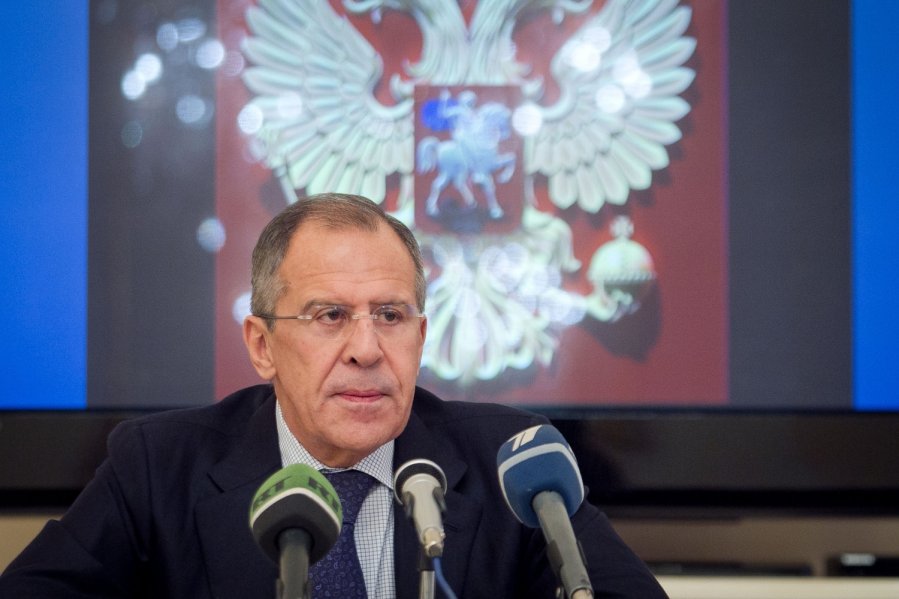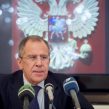
In Munich, Little Talk From or About Russia
Publication: Eurasia Daily Monitor Volume: 11 Issue: 21
By:

Russian politics is currently heavily obsessed with the Winter Olympic Games, which will finally begin in Sochi this week (February 7). President Vladimir Putin is receiving reports about the heroic efforts continuing day and night to make sure the infrastructure is ready—which hardly bodes well for its reliability—and he dismisses the reports about the corruption frenzy in this phenomenally expensive enterprise (https://slon.ru/economics/10_voprosov_putinu_po_povodu_korruptsii_v_sochi-1045717.xhtml). The Olympic torch was brought to Rostov-on-Don on a combine harvester, though a snowplow would have been a far better option, and then delivered to the Elbrus mountaintop, confirming the authorities’ sub-conscious desire to “claim” the whole territory of the sprawling Russian state (https://www.forbes.ru/mneniya-column/tsennosti/247567-suverennyi-fakel-komu-i-chto-pokazala-rossiya-estafetoi-olimpiiskogo). At the same time, counter-terrorist operations continue non-stop across the North Caucasus, aiming at deterring possible rebel attacks (https://www.kavkaz-uzel.ru/articles/237507/). Other news, for instance on a new round of talks with Japan on settling the territorial dispute, are interpreted in the Olympic context: like whether Prime Minister Shinzo Abe will come to Sochi (https://ria.ru/sochi2014_around_games/20140129/991943488.html).
It hardly registers in this news-stream that the 50th Munich security conference took place last weekend, where Foreign Minister Sergei Lavrov did his professional best to uphold Russia’s allegedly indispensable role in international affairs (Nezavisimaya Gazeta, January 31). It is typical, nevertheless, that topics pertaining to Russia featured only in a part of one session, in contrast with 2007, when Putin’s speech was the highlight of the conference. The tone of the Munich discussions on security matters concerning Russia was even harsher than at the curtailed European Union–Russia summit in Brussels earlier last week where the parties stated that mature economic relations had not helped in resolving political disagreements (New Times, January 27). An added issue in Munich was the information provided by the United States to its North Atlantic Treaty Organization (NATO) allies on a possible violation by Russia of the Intermediate-Range Nuclear Forces (INF) Treaty (1987) by the tests of a medium-range cruise missile, which Lavrov refused to comment upon (Nezavisimaya Gazeta, January 31). Statements on a possible withdrawal from the Strategic Arms Reduction Treaty (New START, a.k.a. START III, 2010) give an interesting twist to Lavrov’s complaints about the “puzzlement” in Moscow over NATO’s speculations regarding a “threat from the East” (https://newsru.com/russia/01feb2014/midsnv.html).
Moreover, Russia can hardly contribute to “rebooting trust” between the US and its European allies in the area of cyber-security, where the Kremlin’s role is limited to granting a home office to Edward Snowden, who keeps blowing his whistle (Rossiiskaya Gazeta, January 29). Russia could have, perhaps, usefully partaken in a session at Munich on energy security, but Gazprom has become so deeply unpopular in Europe that states from Lithuania to Greece prefer to meet its executives in court (Kommersant, January 31). Moscow takes particular pride in its newly-inflated role in the Middle East; however, in none of the four sessions in Munich dealing with the sea of troubles in this region was Russia invited to extol its leadership virtues. Indeed, Moscow is perfectly satisfied with the fruitless round of talks in Geneva on mitigating the Syrian civil war (https://svpressa.ru/war21/article/81524/). It also demonstrates determination to proceed with a dubious oil deal with Iran (see EDM, January 16) against objections from Washington about the weakening of the position of the “six powers” (United States, Russia, France, United Kingdom, China and Germany) in the talks on the Iranian nuclear program. Moscow obstinately describes these objections as “harsh pressure” (Kommersant, January 30).
The theme that pushed itself to the forefront of high-profile debates in Munich was Ukraine, as this protracted and potentially destructive political crisis had been receiving far less attention in the West than its intensity warrants. Vitaliy Klichko, one of the leaders of the pro-European protest that exploded in Kiev EU last November, was in Munich to argue the case from Maidan, and US State Secretary John Kerry made a strong statement in support of Ukraine’s “fight for a democratic, European future” (https://newsru.com/world/01feb2014/kerryua.html). Lavrov wasted no time, shooting back with an accusation of Western interference and inciting violent street protests—perfectly in tune with the Kremlin propaganda that has been painting the protesters as “fascists” sponsored by the West (Novaya Gazeta, January 29). Such bellicosity might appear out of place in the sober and agreeable Munich; but in fact, Lavrov was targeting the profound confusion in the EU about what to do with the Ukrainian mess.
Russia counts on the irrefutable fact that it is the only country able both to grant Ukraine massive financial assistance and to inflict severe economic pain upon it if this assistance is turned down. It also has good reason to assume that a US attempt to exercise leadership would fail at forging a workable consensus among its European allies to rebuild the feeble and now discredited Eastern Partnership. Unlike the disunited German leadership, Putin can both make decisions on Ukraine as well as mobilize public support for his policies—indeed, only 4 percent of Russians express support for the protesters in Maidan, while 45 percent feel irritation or indignation at the Ukrainian pro-EU demonstrations (https://www.levada.ru/29-01-2014/sobytiya-v-ukraine-maidan). The decision to postpone further aid to Ukraine until a new government is formed following Prime Minister Mykola Azaravo’s resignation (the first $3 billion out of the promised credit for $15 billion was already provided—and wasted) is certainly very popular (Kommersant, January 30).
With all the heavy levers at his disposal, the only thing Putin cannot achieve in Ukraine is to make the protests disappear. His experiments with exercising “soft power” under the cover of a propaganda offensive instigate a deeper split in the society and a breakup of the country, which cannot be in Russia’s interests. The space for dialogue with the EU on this uprising-turning-collapse has shrunk to a window of acrimony rather than opportunity, since no compromise with the “extremists” would be to Putin’s liking. Many in the Russian elite are worried about this breakdown in communication and try to argue for a new turn toward Europe (https://polit.ru/article/2014/01/31/gp_pol/). Yet, such reasoning finds no purchase inside the Kremlin itself, where the urge to play from a position of power is underpinned by the desire to promote values of obedience to the hallowed leader and intolerance to dissent. Even if the Olympic Games go smoothly, they will add neither to Russia’s prestige nor to its realization that self-degradation follows a movement away from Europe.




